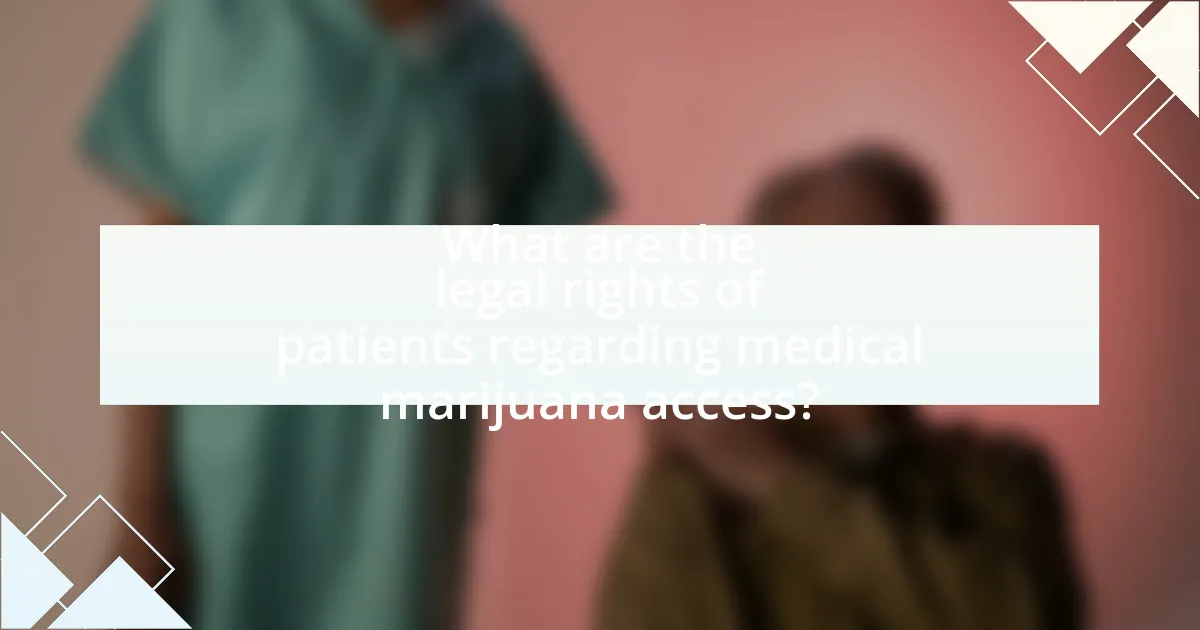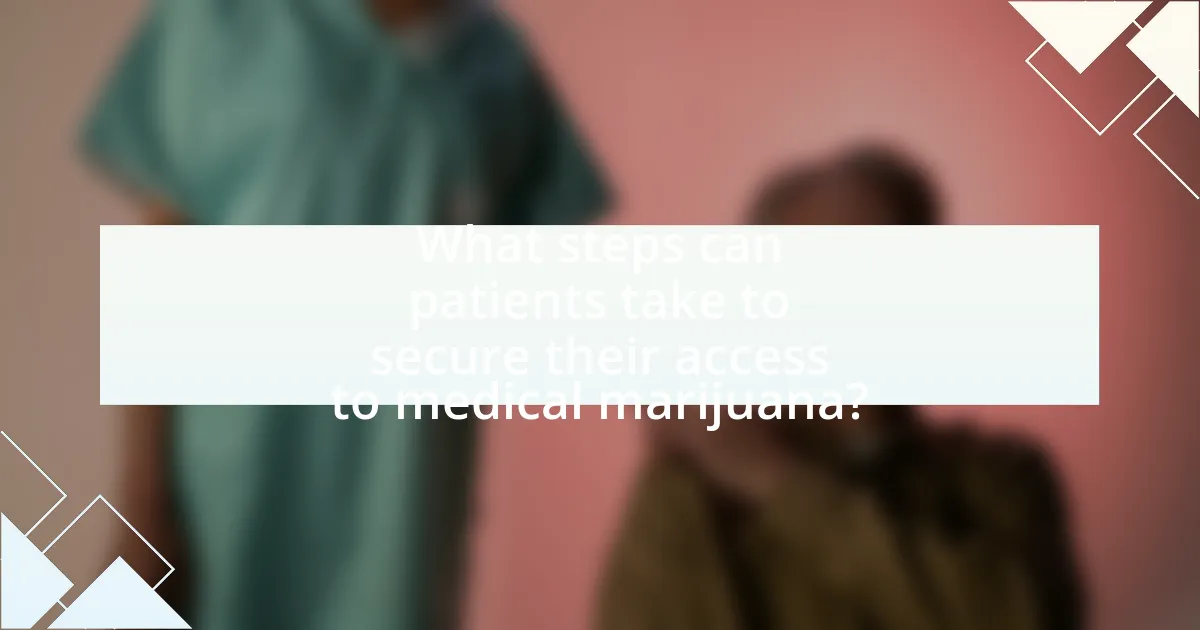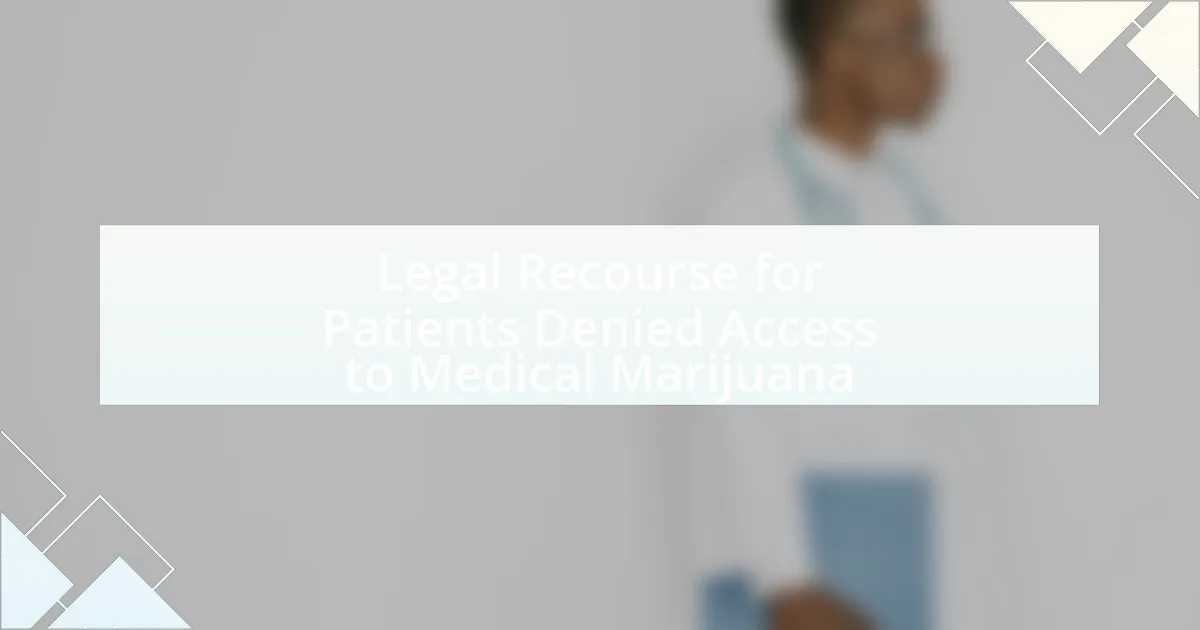The article focuses on the legal recourse available to patients denied access to medical marijuana. It outlines the legal rights of patients in jurisdictions where medical marijuana is permitted, emphasizing the impact of state laws on eligibility, possession limits, and distribution methods. The article also discusses the variations in state laws regarding qualifying conditions, the conflict between federal and state regulations, and the implications of federal classification of marijuana. Additionally, it details the steps patients can take to challenge denials, the importance of proper documentation, and best practices for navigating the application process to secure access to medical marijuana.

What are the legal rights of patients regarding medical marijuana access?
Patients have the legal right to access medical marijuana in jurisdictions where it is permitted by law, typically requiring a valid prescription or recommendation from a licensed healthcare provider. In the United States, over 30 states and the District of Columbia have enacted laws allowing for medical marijuana use, which grants patients the right to obtain, possess, and use marijuana for medical purposes as outlined in state statutes. For example, California’s Compassionate Use Act allows patients with qualifying conditions to access medical marijuana, and similar laws exist in other states, providing a legal framework for patient access. Additionally, patients may have the right to challenge denials of access through administrative appeals or legal action, depending on state regulations.
How do state laws impact patient access to medical marijuana?
State laws significantly impact patient access to medical marijuana by determining eligibility, possession limits, and distribution methods. For instance, states with comprehensive medical marijuana programs allow patients with qualifying conditions to obtain prescriptions, while states with restrictive laws may limit access to only specific conditions or require extensive documentation. According to the National Conference of State Legislatures, as of 2023, 38 states and Washington D.C. have legalized medical marijuana, showcasing a trend towards increased access. However, disparities exist; some states impose strict regulations that can hinder timely access, such as lengthy application processes or limited dispensary locations. These variations in state laws directly influence how easily patients can obtain the medication they need for treatment.
What variations exist in state laws concerning medical marijuana?
State laws concerning medical marijuana vary significantly across the United States in terms of legality, qualifying conditions, patient access, and regulatory frameworks. For instance, some states like California and Colorado have comprehensive medical marijuana programs that allow a wide range of conditions and provide extensive access to patients, while states like Idaho and Nebraska have not legalized medical marijuana at all. Additionally, states such as Florida and New York have specific qualifying conditions that must be met for patients to obtain medical marijuana, which can include chronic pain, PTSD, and cancer, but the list of conditions varies widely. Furthermore, regulations regarding the cultivation, distribution, and sale of medical marijuana differ, with some states allowing home cultivation and others prohibiting it entirely. These variations reflect differing state policies and public attitudes toward medical marijuana, influencing patient access and legal recourse for those denied access.
How do these laws affect patient eligibility for medical marijuana?
Laws governing medical marijuana directly influence patient eligibility by establishing specific qualifying conditions and regulatory frameworks. For instance, many states require patients to have a documented medical condition, such as chronic pain or epilepsy, to qualify for a medical marijuana card. Additionally, these laws often mandate that patients obtain a recommendation from a licensed healthcare provider, which further delineates eligibility criteria. In states like California, the Compassionate Use Act allows patients with a physician’s recommendation to access medical marijuana, while other states may have stricter guidelines that limit eligibility to certain diagnoses. This regulatory landscape shapes who can legally access medical marijuana, thereby impacting patient eligibility significantly.
What federal laws govern medical marijuana use?
The federal laws governing medical marijuana use primarily include the Controlled Substances Act (CSA), which classifies marijuana as a Schedule I substance, indicating it has a high potential for abuse and no accepted medical use. This classification creates significant legal barriers for medical marijuana use at the federal level. Additionally, the Rohrabacher-Farr Amendment, passed in 2014, prohibits the Department of Justice from using federal funds to interfere with state medical marijuana laws, providing some protection for states that have legalized medical marijuana. However, despite this amendment, marijuana remains illegal federally, complicating legal recourse for patients denied access to medical marijuana.
How does federal law conflict with state laws on medical marijuana?
Federal law conflicts with state laws on medical marijuana primarily because marijuana remains classified as a Schedule I controlled substance under the Controlled Substances Act, which prohibits its use, distribution, and possession. This federal classification directly contradicts the laws of many states that have legalized medical marijuana, allowing its use for various medical conditions. For instance, as of October 2023, over 30 states have enacted laws permitting medical marijuana, creating a legal landscape where state-licensed activities can lead to federal prosecution. This conflict complicates legal recourse for patients denied access, as federal law does not recognize state-sanctioned medical marijuana use, leaving patients vulnerable to legal penalties despite state protections.
What are the implications of federal classification of marijuana?
The federal classification of marijuana as a Schedule I substance has significant implications for legal recourse available to patients denied access to medical marijuana. This classification indicates that marijuana is considered to have a high potential for abuse and no accepted medical use, which restricts research, funding, and the ability of states to implement their medical marijuana programs without federal interference. Consequently, patients may face legal challenges when seeking access to medical marijuana, as federal law supersedes state law, leading to potential criminal charges for possession or use even in states where it is legal. Furthermore, this classification complicates the ability of patients to claim protections under federal law, limiting their options for legal recourse when denied access to necessary medical treatment.
What recourse do patients have if denied access to medical marijuana?
Patients denied access to medical marijuana can pursue several legal recourses, including filing a complaint with state medical boards, seeking legal representation to challenge the denial, or appealing the decision through administrative processes. Each state has specific regulations governing medical marijuana access, and patients can often find support through advocacy groups that provide guidance on navigating these legal avenues. For instance, in states like California, patients can appeal denials through the Department of Health, which oversees medical marijuana programs, ensuring that patients have a structured process to contest decisions.
What legal actions can patients pursue against healthcare providers?
Patients can pursue several legal actions against healthcare providers, including medical malpractice claims, breach of contract actions, and complaints to regulatory bodies. Medical malpractice claims arise when a healthcare provider fails to meet the standard of care, resulting in harm to the patient; for example, if a provider improperly denies access to medical marijuana despite its medical necessity. Breach of contract actions can occur if a healthcare provider fails to fulfill the terms of a treatment agreement, which may include the provision of medical marijuana. Additionally, patients can file complaints with state medical boards or other regulatory agencies, which can investigate the provider’s conduct and impose disciplinary actions if warranted. These legal avenues are supported by the legal framework governing healthcare practices and patient rights, ensuring that patients have recourse when denied necessary medical treatments.
How can patients challenge state decisions regarding medical marijuana access?
Patients can challenge state decisions regarding medical marijuana access by filing administrative appeals or lawsuits in state courts. Administrative appeals allow patients to contest decisions made by state agencies, often requiring them to follow specific procedures outlined in state regulations. If the administrative route does not yield satisfactory results, patients can pursue legal action, arguing violations of state laws or constitutional rights, such as the right to access medical treatment. For instance, in states like California, patients have successfully challenged restrictive regulations by citing the Compassionate Use Act, which mandates access to medical marijuana for qualifying patients.

What are the common reasons for denial of medical marijuana access?
Common reasons for denial of medical marijuana access include lack of a qualifying medical condition, insufficient documentation from healthcare providers, failure to meet state residency requirements, and previous felony drug convictions. For instance, many states require specific medical diagnoses, such as cancer or epilepsy, to qualify for medical marijuana, and without these, access is denied. Additionally, if patients do not provide adequate medical records or a recommendation from a licensed physician, their applications may be rejected. Furthermore, some states enforce residency laws that require applicants to be legal residents, and those with certain criminal backgrounds may also face restrictions, reflecting the legal framework governing medical marijuana access.
How do medical conditions influence access to medical marijuana?
Medical conditions significantly influence access to medical marijuana by determining eligibility for prescriptions based on state laws. Many jurisdictions require patients to have specific qualifying conditions, such as cancer, epilepsy, or chronic pain, to obtain a medical marijuana card. For instance, a study published in the Journal of Pain Research indicates that states with broader qualifying conditions report higher patient enrollment in medical marijuana programs, demonstrating a direct correlation between the types of medical conditions recognized and patient access. Thus, the presence of a qualifying medical condition is essential for legal access to medical marijuana, shaping the landscape of patient care and treatment options.
What specific conditions qualify for medical marijuana in various states?
Specific conditions that qualify for medical marijuana vary by state, but common qualifying conditions include chronic pain, cancer, epilepsy, multiple sclerosis, and post-traumatic stress disorder (PTSD). For example, California allows medical marijuana for conditions such as arthritis and migraines, while New York includes severe pain and nausea as qualifying conditions. In Florida, patients with conditions like ALS and Crohn’s disease can qualify. Each state has its own regulatory framework, which defines the specific medical conditions eligible for treatment with medical marijuana, ensuring that patients have access based on their medical needs.
How do healthcare provider opinions affect patient access?
Healthcare provider opinions significantly affect patient access to medical marijuana by influencing prescribing practices and patient referrals. When healthcare providers express skepticism or lack of knowledge about medical marijuana, patients may face barriers in obtaining necessary prescriptions. For instance, a study published in the Journal of Pain Research found that providers’ attitudes towards medical marijuana directly correlate with their willingness to recommend it, impacting patient access rates. Additionally, state regulations often require healthcare provider recommendations for patients to qualify for medical marijuana programs, further emphasizing the critical role of provider opinions in shaping patient access.
What role does patient documentation play in access denial?
Patient documentation plays a critical role in access denial to medical marijuana by serving as the primary evidence of a patient’s eligibility and medical necessity. In jurisdictions where medical marijuana is legal, healthcare providers must document specific medical conditions and symptoms that qualify a patient for treatment. Inadequate or incomplete documentation can lead to denial of access, as regulatory bodies often require comprehensive records to verify compliance with legal standards. For instance, a study published in the Journal of Medical Cannabis in 2021 highlighted that 40% of access denials were attributed to insufficient patient documentation, underscoring the importance of thorough and accurate medical records in securing access to medical marijuana.
What types of documentation are typically required for medical marijuana access?
To access medical marijuana, patients typically need a physician’s recommendation or certification, proof of residency, and a completed application form for a medical marijuana card. The physician’s recommendation must come from a licensed healthcare provider who has evaluated the patient’s medical condition and determined that medical marijuana is appropriate for treatment. Proof of residency often includes a government-issued ID or utility bill showing the patient’s address. The application form usually requires personal information and may include details about the patient’s medical history. These documentation requirements ensure that access to medical marijuana is regulated and that patients meet the necessary criteria for its use.
How can incomplete documentation lead to denial?
Incomplete documentation can lead to denial of access to medical marijuana because it fails to provide the necessary evidence required to meet legal and regulatory standards. For instance, if a patient does not submit complete medical records or a valid recommendation from a licensed healthcare provider, the reviewing authority may determine that the application lacks sufficient justification for approval. This is supported by regulations in many jurisdictions that explicitly require comprehensive documentation to establish eligibility for medical marijuana use, thereby directly linking incomplete submissions to the likelihood of denial.

What steps can patients take to secure their access to medical marijuana?
Patients can secure their access to medical marijuana by obtaining a valid medical marijuana recommendation from a licensed healthcare provider. This recommendation is essential as it legally permits patients to purchase and use medical marijuana in states where it is authorized. Additionally, patients should ensure they are registered with their state’s medical marijuana program, which often requires submitting an application along with the healthcare provider’s recommendation. Compliance with state regulations, including understanding possession limits and approved usage methods, further solidifies their legal access. According to the National Conference of State Legislatures, as of 2023, 38 states and the District of Columbia have legalized medical marijuana, highlighting the importance of following state-specific guidelines to avoid legal issues.
How can patients effectively navigate the legal system for recourse?
Patients can effectively navigate the legal system for recourse by understanding their rights, gathering necessary documentation, and seeking legal assistance. Familiarity with state laws regarding medical marijuana is crucial, as regulations vary significantly; for instance, in states where medical marijuana is legal, patients must have a qualifying condition and obtain a physician’s recommendation. Collecting medical records, denial letters, and any relevant correspondence strengthens their case. Consulting with an attorney who specializes in medical marijuana law can provide guidance on filing complaints or pursuing litigation, as legal experts can help interpret complex regulations and represent patients in court if necessary.
What resources are available for patients seeking legal assistance?
Patients seeking legal assistance can access various resources, including legal aid organizations, state bar associations, and specialized law firms focusing on medical marijuana laws. Legal aid organizations often provide free or low-cost legal services to individuals facing financial hardships, while state bar associations can offer referrals to attorneys experienced in medical marijuana cases. Additionally, specialized law firms may provide consultations and representation for patients navigating legal challenges related to medical marijuana access. These resources are crucial for patients to understand their rights and pursue legal recourse effectively.
How can patients prepare for legal proceedings related to access denial?
Patients can prepare for legal proceedings related to access denial by gathering comprehensive documentation of their medical history, treatment plans, and any communications with healthcare providers regarding their access to medical marijuana. This preparation includes collecting prescriptions, medical records, and any denial letters received, which serve as evidence of the need for medical marijuana and the denial of access. Additionally, patients should familiarize themselves with relevant state laws and regulations governing medical marijuana use, as these laws can provide a legal basis for their claims. Engaging with legal counsel experienced in medical marijuana cases can also enhance their understanding of the legal process and strengthen their case.
What best practices should patients follow when applying for medical marijuana?
Patients should follow several best practices when applying for medical marijuana to enhance their chances of approval. First, patients must obtain a recommendation from a qualified healthcare provider who is knowledgeable about medical marijuana and its benefits for specific conditions. Research indicates that states with stringent medical marijuana laws require a physician’s recommendation, which serves as a critical component of the application process.
Next, patients should ensure they meet their state’s eligibility criteria, which often include having a qualifying medical condition such as chronic pain, cancer, or epilepsy. According to the National Conference of State Legislatures, each state has its own list of qualifying conditions, and understanding these can prevent unnecessary application rejections.
Additionally, patients should gather all necessary documentation, including medical records and proof of residency, to support their application. A study published in the Journal of Psychoactive Drugs highlights that comprehensive documentation can significantly improve the likelihood of approval.
Finally, patients should be aware of the application deadlines and fees associated with the process, as these can vary by state. Adhering to these guidelines can streamline the application process and increase the chances of receiving medical marijuana access.
How can patients ensure they meet all legal requirements for access?
Patients can ensure they meet all legal requirements for access to medical marijuana by obtaining a valid medical marijuana recommendation from a licensed healthcare provider. This recommendation must comply with state laws, which typically require a qualifying medical condition and a thorough evaluation by the provider. Additionally, patients should register with their state’s medical marijuana program, if applicable, and keep updated on any changes in legislation that may affect their access rights. Compliance with these steps is crucial, as failure to adhere to state-specific regulations can result in denial of access or legal repercussions.
What common mistakes should patients avoid during the application process?
Patients should avoid incomplete applications during the medical marijuana application process. Submitting applications without required documentation, such as proof of residency or a physician’s recommendation, can lead to delays or denials. Additionally, patients often overlook the importance of adhering to specific state regulations, which can vary significantly; for example, some states require a certain format for medical records. Failing to follow these guidelines can result in rejection. Accurate and thorough completion of the application is essential, as statistics show that nearly 30% of applications are denied due to such errors.

Leave a Reply